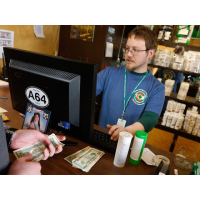Legal Marijuana Growers and Sellers Forced to Pay more Federal Taxes than other Industries
 Denver marijuana shop clerk rings up a sale (photo: Brennan Linsley, AP)
Denver marijuana shop clerk rings up a sale (photo: Brennan Linsley, AP)
Making money has not been a problem for the legal marijuana trade, but paying taxes sure is.
The legalization of medical and recreational marijuana has spurred the rise of growers and sellers in nearly two dozen states. But the sanctioning of their business operations has not included the benefit of tax deductions that traditional companies have long enjoyed.
The result has been hefty tax bills for marijuana shops.
One business that oversees the operation of five marijuana shops in Colorado, which was the first state to decriminalize recreational pot, cost owner Bruce Nassau $275,000 in taxes. Another marijuana dispensary owner, who brought in $1.7 million in business revenue last year, got hit with a federal tax bill for $866,000.
The problem for Nassau and others is they can’t take standard business deductions due to “a decades-old law aimed at preventing drug dealers from claiming their smuggling costs and couriers as business expenses on their tax returns,” the Times’ Jack Healy wrote.
That law, adopted in 1982 and now known commonly as 280E, bans all tax credits and deductions from “the illegal trafficking in drugs.” Even though Nassau’s operation is legal within his state, marijuana is still outlawed at the federal level, which is why the Internal Revenue Service still uses 280E to punish legitimate marijuana operations.
It means pot operators find themselves paying as much as a 70% tax on their profits, compared to about 30% for “normal” businesses, because they can’t deduct things like rent, employee salaries or utility bills.
Two Democratic U.S. congressmen representing Oregon, Sen. Ron Wyden and Rep. Earl Blumenauer, have introduced legislation that would permit marijuana businesses that are complying with their states’ legalization laws to take deductions when filing their federal tax returns.
“It is the last domino that has to fall for us to be treated like any other business in the country,” Tim Cullen, co-owner of five Colorado marijuana shops, told the Times. “We’re not a black-market cocaine dealer. We’re totally on board and on the level. We’d like to be treated as such.”
-Noel Brinkerhoff, Danny Biederman
To Learn More:
Legal Marijuana Faces Another Federal Hurdle: Taxes (by Jack Healy, New York Times)
Federal Judge Dashes High Hopes for Less Harsh Marijuana Reclassification (by Ken Broder, AllGov California)
3-Day Hearing in Federal Court Challenges Putting Marijuana in the Same Drug Classification as Heroin (by Steve Straehley, AllGov)
- Top Stories
- Unusual News
- Where is the Money Going?
- Controversies
- U.S. and the World
- Appointments and Resignations
- Latest News
- Trump Orders ICE and Border Patrol to Kill More Protestors
- Trump Renames National Football League National Trump League
- Trump to Stop Deportations If…
- Trump Denounces World Series
- What If China Invaded the United States?






Comments